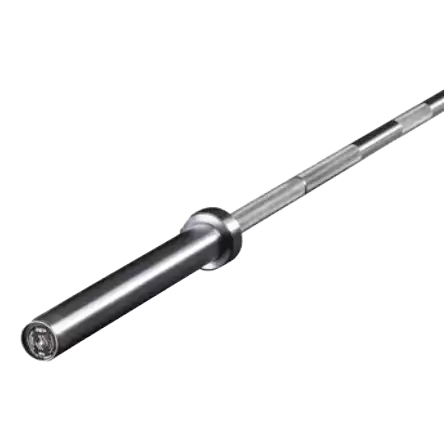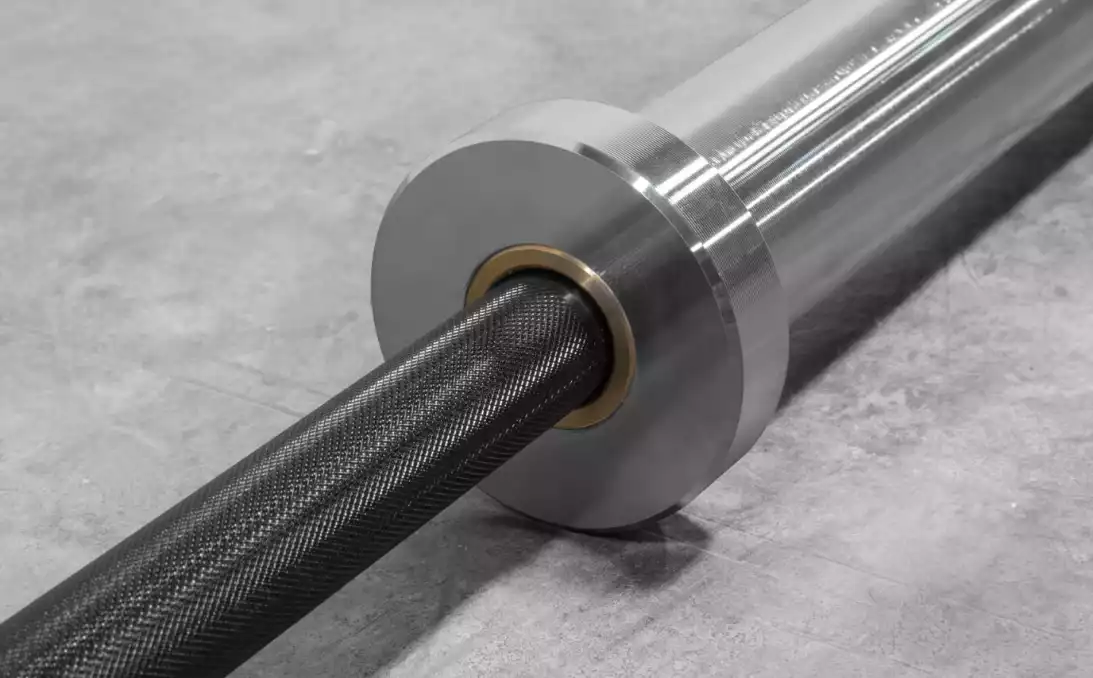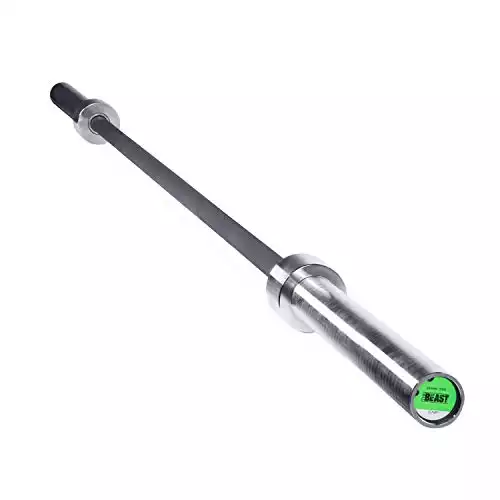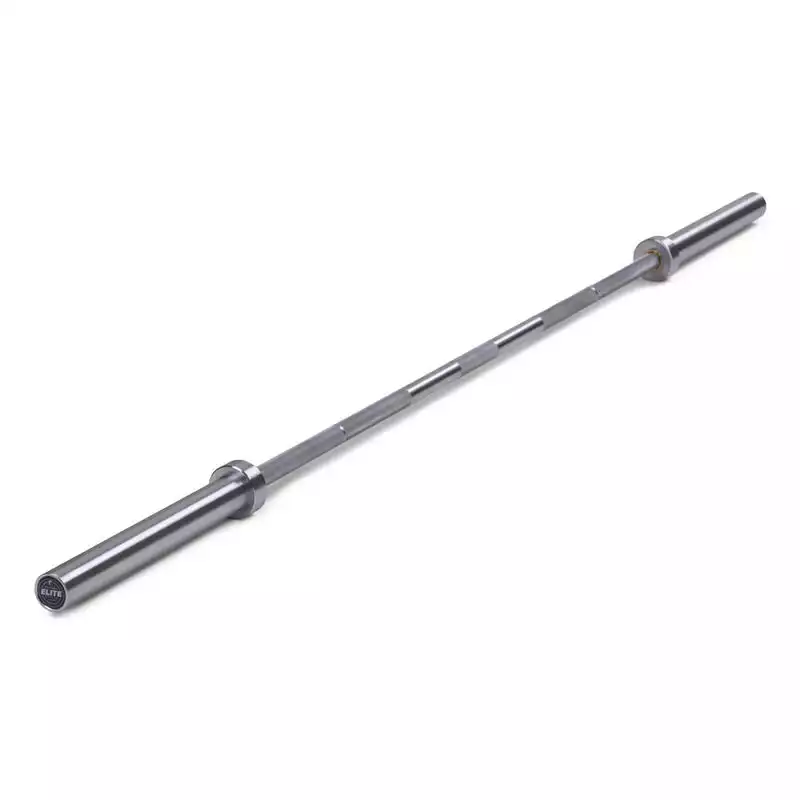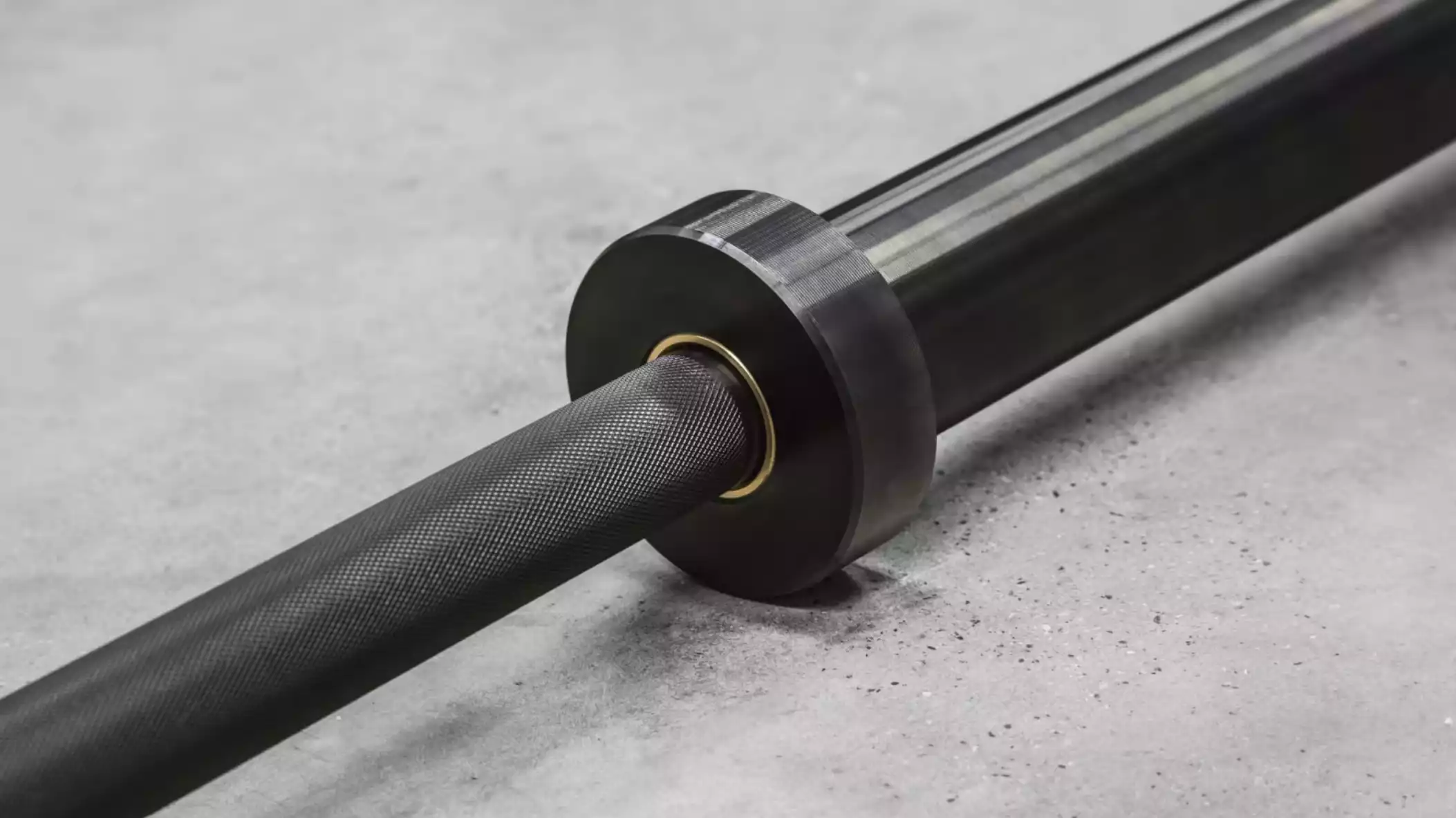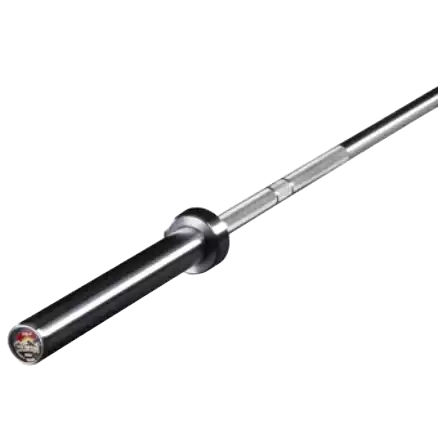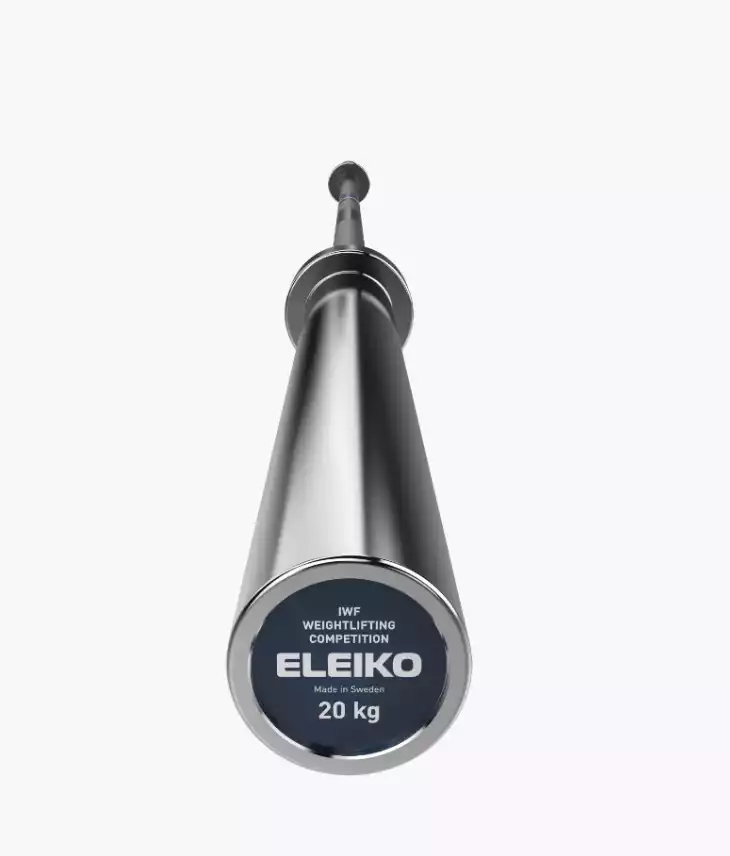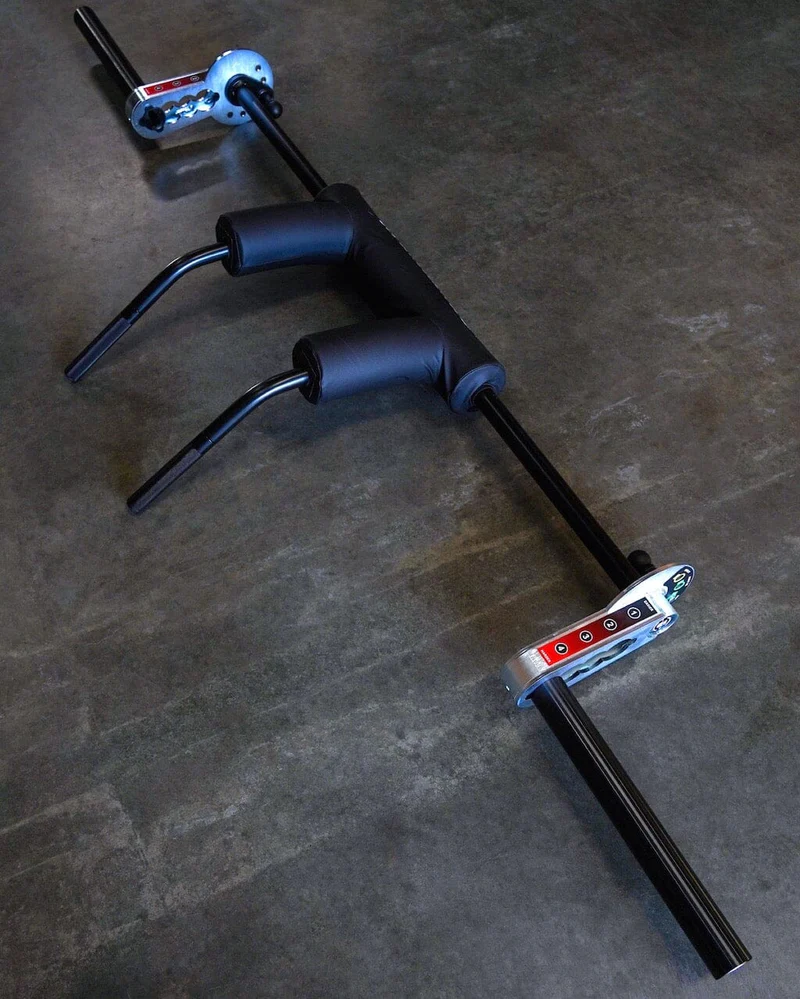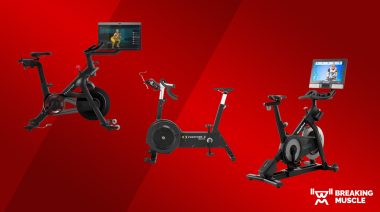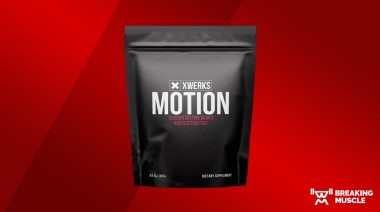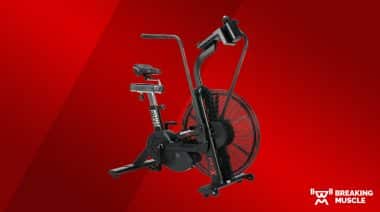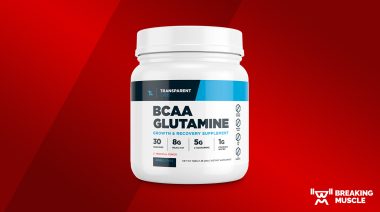If you’re creating a personal workout space, one of the best pieces of home gym equipment to buy is a barbell. The barbell is very versatile because you can train the entire body with just that and weight plates. But as basic as a barbell is, it can also be quite the investment, and you want to get the biggest return on that investment by choosing the right barbell for your particular type of training. There are also so many different types of barbells that serve different needs, and figuring all of that out may be overwhelming.
We’ve done the hard work already and found the best of the best on the market, and we’re sharing our choices as well as our reasons for making these picks here. What’s the best barbell for squats and deadlifts? What should you get if you’re a beginner? You’re about to learn a lot about different barbells so you can make the best choice possible and set yourself up for training success.
How We Chose the Best Barbells
Our team comprises CrossFitters, strength and conditioning coaches, certified personal trainers, and fitness enthusiasts who have used multiple barbells in both commercial and home gym settings. Pulse Beat Fit also has a testing facility in Springfield, MO, where we’ve experimented with barbells from top brands such as REP Fitness, Rogue, and Titan. When testing barbells, we analyze criteria such as overall construction quality, tensile strength, knurling, sleeve spin, and versatility. Out of the dozens of barbells we’ve tested, we narrowed our list down to what we think are the eight best.
We also considered everything from the reputation of the company to the level of the trainee who would be using the barbell. Furthermore, our goal was to ensure that we had options for various training styles and budgets, and you’ll see that reflected in our selections.
Our Top Picks for the Best Barbells
- Best Barbell for Powerlifting: REP Fitness Double Black Diamond Power Bar
- Best Barbell for Women: Rogue Fitness Bella Bar
- Best Barbell on Amazon: CAP Barbell The Beast
- Best Budget Barbell: Titan Fitness Elite Series Power Barbell
- Best CrossFit Barbell: Rogue Fitness Ohio Bar
- Best Multi-Purpose Barbell: REP Fitness Colorado Bar
- Best Olympic Barbell: Eleiko IWF Weightlifting Competition Bar
- Best Specialty Barbell: Kabuki Strength Transformer Bar
Best Barbell for Powerlifting: REP Fitness Double Black Diamond Power Bar
Pros
- Reasonably priced for a barbell of its caliber
- Made according to IPF specifications
- Available in three different finishes
Cons
- Knurling may be too aggressive for beginners
The Double Black Diamond Power Bar is a newcomer to REP Fitness’s barbell lineup. The name pays homage to the ski culture of Colorado, where REP is based, and represents the hardest and most challenging ski slopes. We think it’s the best barbell for powerlifting due to its high-quality construction, aggressive and grippy knurling, and high tensile strength (how much weight the barbell can hold before it breaks) of 200k pounds per square inch (PSI), which is on par with most power bars on the market.
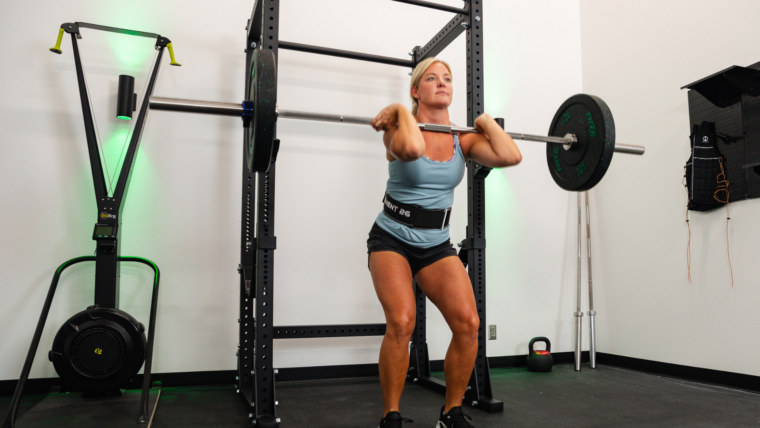
The barbell is manufactured to International Powerlifting Federation (IPF) standards. It weighs 20 kilograms (44 pounds) and features a center knurl to help keep the bar on your back during squats. The Double Black Diamond Bar has single knurl rings on the shaft, which offer a visual reference so you can ensure your hands are spaced evenly apart. They also indicate the widest distance you can set your grip for the bench press in powerlifting competitions.
The mountain knurling is quite aggressive, which is to be expected of a power bar. However, the barbell uses higher teeth per inch (TPI, or the number of teeth you can see per inch on the barbell) and a smaller mountain than other power bars, such as the Rogue Ohio bar. While it won’t exactly feel comfortable in your hands, it likely won’t feel as sharp as some of its competitors.
Amanda Dvorak, Pulse Beat Fit’s Reviews Editor, recently had the chance to test the Double Black Diamond Bar. She used it for moderately heavy deadlifts, and while she could feel the difference in the knurling compared with other barbells she uses often, it wasn’t tearing her skin. However, she claims that she has some pretty rough calluses on her hands, which likely helped with the feel of the barbell. A beginner who hasn’t yet developed calluses may have a harder time lifting with the Double Black Diamond Bar.
You can choose between several finishes: all stainless steel, a stainless steel shaft with hard chrome sleeves, or a Cerakote shaft with Duracoat sleeves. The Cerakote is a good option if you want to add some style to your home gym. It’s available in black, blue, green, or red. The stainless steel should theoretically hold up to any kind of training environment, but in our experience, REP’s stainless steel tends to rust quickly. It may not be the best choice if you keep your barbell in a non-temperature-controlled garage.
REP has added a few design touches that help the Double Black Diamond Bar stand out from its competition. For example, the inside of the collar sleeve is etched with REP’s logo and the barbell’s name. The endcaps feature raised silver lettering and a double black diamond marking, giving the barbell a high-end aesthetic.
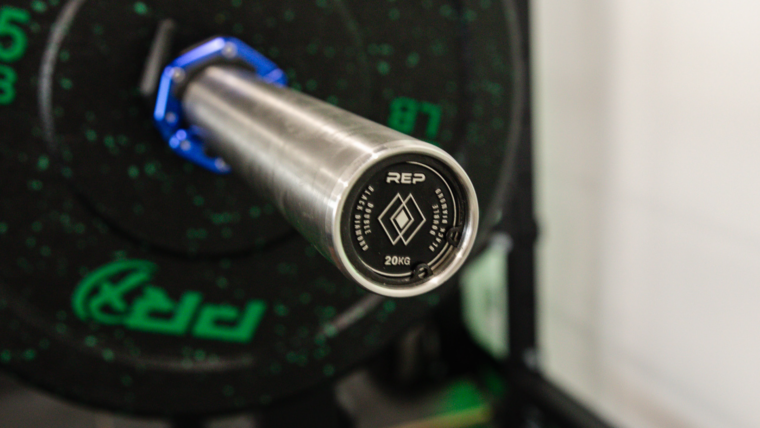
If you’re a powerlifter who appreciates sharp-looking equipment that can also stand up to the toughest workouts, this is a barbell worth considering.
For more, read our full REP Fitness Double Black Diamond Power Bar Review.
Best Barbell for Women: Rogue Fitness Bella Bar
Pros
- Available in multiple finishes
- High tensile strength
- Multi-purpose bar
Cons
- Certain finishes may fade quickly
- No center knurl
- Short sleeve length
Women who compete in various strength sports such as CrossFit could get a lot of good use out of the Rogue Fitness Bella Bar because it’s similar to those used in competitions. It weighs 15 kilograms (33 pounds), is 79 inches long, and has a 25-millimeter diameter, as opposed to most Olympic barbells that weigh 20 kilograms (44 pounds), are 87 inches long, and have a 28- to 30-millimeter diameter. The smaller diameter makes it easier to use for women, who typically have smaller hands than men, and newer lifters, who tend to have a weak grip.
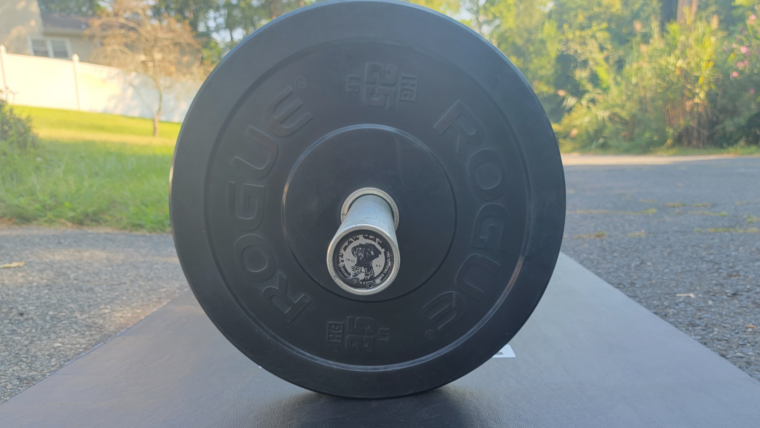
The Bella bar has multiple knurl markings because it can also be used for Olympic weightlifting and general strength training. The sleeves spin very well, so you can curl or clean with smooth motions and no resistance to spinning. It can be used for training the three powerlifting movements — squat, bench press, and deadlift — but it’s not made to IPF standards. For that reason, competitive female powerlifters should look for a bar that meets competition specifications.
Regarding the knurling, a product tester on the Pulse Beat Fit team notes, “Compared to straight up powerlifting bars, the knurling on the Bella is pretty passive…I personally like the knurl on the Bella because it’s rough enough to give you a decent grip but not something that is going to scratch up your body if you’re cycling the barbell.” For women who specialize in powerlifting, the somewhat passive knurling may be an issue, though it should be sufficient for casual lifters and high-rep training.
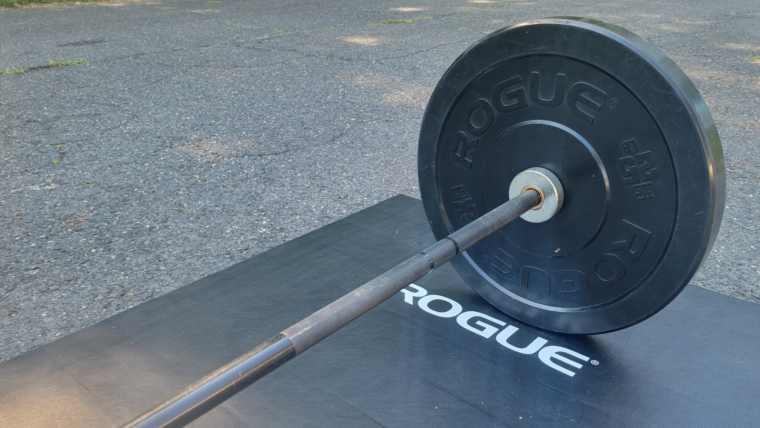
Another drawback is that if you use the black zinc barbell frequently or store it in a non-temperature-controlled environment, the color of the finish may fade. Pulse Beat Fit Reviews Editor Amanda Dvorak has had the Bella barbell in the black zinc finish since 2016. She keeps it in her garage year-round, and the black color has faded substantially.
“I still love my Bella bar and get a lot of use out of it for my CrossFit workouts,” she says, “but it looks pretty beat up now. Granted, I have had the barbell for seven years, so I know it won’t look brand new after all this time. But I don’t recommend the black zinc finish to anyone who cares about the aesthetics of their barbell.”
RELATED: Best Adjustable Dumbbells for Home Gyms
Best Barbell on Amazon: CAP Barbell The Beast
Pros
- High weight capacity
- Black phosphate finish
- Will accommodate all Olympic plates
Cons
- No center knurl
- Short return warranty
- Shorter sleeve length than other bars
Amazon is one of the first places people go to buy fitness equipment. The Beast by CAP Barbell is a solid choice to consider if your home gym needs a basic barbell to start with. It has bushings on the inside of the sleeve instead of bearings, but even though bushings tend to rotate more slowly than bearings, the barbell’s sleeves still spin well. It can be used for dynamic movements such as the clean and jerk or snatch in Olympic weightlifting or for static exercises like squats and deadlifts for powerlifting.
The Beast Barbell is best suited for new powerlifters who want something less expensive and aren’t yet moving very heavy weight. CAP claims that it has a 1,200-pound weight capacity, but the tensile strength is only 110k PSI, which is much lower than barbells like REP’s Double Black Diamond Barbell (200k PSI). It will be reliable enough for beginners, but if you start to become more serious about lifting, you may want to consider upgrading to a barbell with a higher tensile strength that will be more durable.
There is no knurling in the center, which can help determine if the barbell is center and keep it on the back for squats, but this will help prevent discomfort on the neck when doing exercises like front squats. The black finish makes it look nice, though some customers have stated that the barbell arrived with a thick coating of oil on the shaft. You may want to wipe it down with a cloth before you use it to ensure it doesn’t slip from your hands.
Best Budget Barbell: Titan Fitness Elite Series Power Barbell
Pros
- Chrome finish
- Budget-friendly
- Two- or three-year warranties available
Cons
- No dual knurling
- Only one color available
The Titan Fitness Elite Series Power Barbell is a budget-friendly choice. It costs just under $230, compared to others that can cost $330 or more. And while you can also find plenty of barbells under $200, they likely won’t be able to handle as much weight as this one. Titan claims that it has a weight capacity of 2,000 pounds and a 220k PSI tensile strength, making it stronger than almost every other barbell on this list. It should hold up to the most intense workouts you can put it through.
It can be used as a powerlifting barbell, for bodybuilding purposes, or for general training. However, there are no dual markings, and the knurling is quite aggressive, so it wouldn’t be optimal as an Olympic weightlifting or CrossFit bar. The knurling can be uncomfortable on the hands during dynamic exercises like cleans and thrusters, and the lack of an outer knurl ring may make it difficult to determine where to grip the bar for snatches.
Best CrossFit Barbell: Rogue Fitness Ohio Barbell
Pros
- Good whip
- Comfortable knurling with dual marks
- Lifetime warranty
Cons
- No 15-kilogram option
- Bronze bushings instead of bearings
- No steel or chrome finish option
Many people consider the Ohio barbell one of the best on the market because of its strength, whip, and comfort for trainees of all levels. Made with US steel, it has a tensile strength of 190k PSI and comes in multiple finishes, such as Cerakote, black oxide, or black zinc. Cerakote and black zinc are known to be rust-resistant, and they can protect the barbell if you store it in a humid environment. Black oxide can make the bar feel more comfortable on the knurling, though the finish tends to fade quickly.
The Ohio bar is used in many CrossFit competitions, and it can be used as a weightlifting barbell or for heavy power training. Because it’s a multi-purpose bar, it has dual knurl rings to help you ensure you have an even grip on the bar for various lifts, like snatches or bench presses.
However, if you specialize in powerlifting or Olympic weightlifting, you may want to look at another barbell that’s specific to your sport. The Ohio bar uses bushings on the sleeves, which don’t rotate as fast or as smoothly as barbells with needle bearings. Sleeve rotation is especially important for the Olympic lifts because it helps prevent stress on the joints during dynamic movements. If you train solely for Olympic lifting, you may want to look for a weightlifting-specific barbell with a better sleeve rotation.
Similarly, unlike true powerlifting barbells, the Ohio bar doesn’t have a center knurl. This makes it more comfortable on the throat for cleans, thrusters, or any other lifts where you’d hold the bar in the front rack position, but it means the bar doesn’t meet International Powerlifting Federation (IPF) standards. However, Rogue sells an Ohio Power Bar that conforms to IPF specifications and may be a better choice for competitive powerlifters.
The Ohio bar doesn’t have aggressive knurling, but it isn’t likely to slip out of your hands. This barbell is suitable for all levels of training and could be the only barbell you buy for quite some time. It has a lifetime guarantee against bending when used properly (for example, not dropped on a bench, box, metal spotter arms in a power rack, or with iron plates loaded on it).
Rogue has also rated the Ohio bar an F8-R on its F Scale, a rating system that measures barbells’ durability. F1 is the lowest possible rating, and F16 is the highest, putting the Ohio bar right in the middle. The “R” indicates that the bar has been treated with Rogue Work Hardening, the brand’s proprietary process for improving its barbells’ ability to withstand repeated drops. In a home gym setting, the Ohio bar should last for at least 10 to 15 years.
RELATED: Best Kettlebells for CrossFit, Beginners, and More
Best Multi-Purpose Barbell: REP Fitness Colorado Bar
Pros
- Affordably priced
- Composite bushings are quieter than bronze bushings
- Can choose from five colors if you get the Cerakote finish
Cons
- Knurling may not be aggressive enough for heavy powerlifting
- Only available in a 20-kilogram (44-pound) option
While the REP Double Black Diamond Bar is more of a strict powerlifting barbell, the Colorado Bar is an all-purpose barbell that you can also use for CrossFit, Olympic weightlifting, and general strength training. The shaft has dual knurl rings, enabling you to easily find an optimal grip width for the bench press or snatch. There’s no center knurl, so the bar shouldn’t irritate the skin on your throat when doing front squats, cleans, or thrusters.
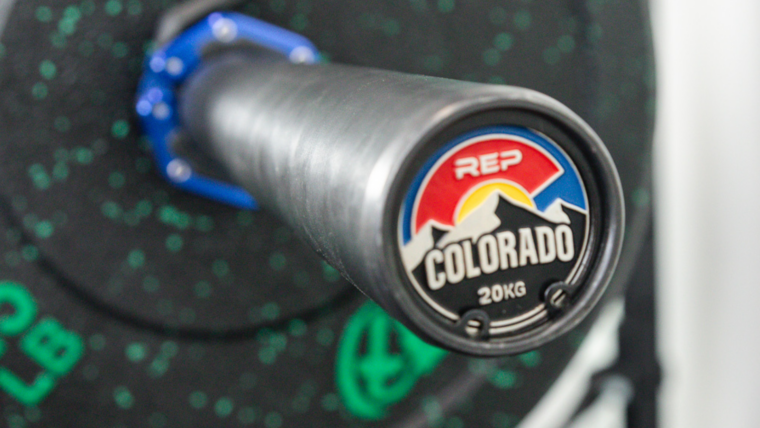
You have a choice of Cerakote or hard chrome finishes. If you like color, the Cerakote finish may be a better choice, as you can get it in red, green, black, blue, or white. A Cerakote barbell may also be more suitable for those who train in humid environments or really put their barbells through a lot of abuse. Cerakote and chrome both offer some corrosion resistance, but the Cerakote Colorado Bar features Duracoat sleeves. Duracoat is a chemical process that hardens the steel, offering even more protection against corrosion and other imperfections.
The composite bushings on the Colorado bar’s sleeves spin decently fast, though you shouldn’t expect the same type of effortless spin that you’d find on a barbell with needle bearings. One thing we do like, though, is that the composite bushings offer noise-dampening qualities. While the Colorado bar won’t be completely silent when you drop it, it will make less noise than barbells made with bronze bushings. This is a welcome benefit for those who train while other individuals in the home are sleeping or working.
Amanda Dvorak, an editor on the Pulse Beat Fit team, was able to get her hands on the Colorado bar recently at our testing facility in Springfield, MO. “The Colorado bar looks really cool in person,” she said. “The one I tried had the green Cerakote finish. The green is more of a deep olive green, not a bright, flashy green, which is nice for lifters who have more subdued tastes. The knurling isn’t super aggressive, but I was still able to get a good grip on the bar for deadlifts. And when I used the bar for power cleans, the knurling didn’t rip up my hands.”
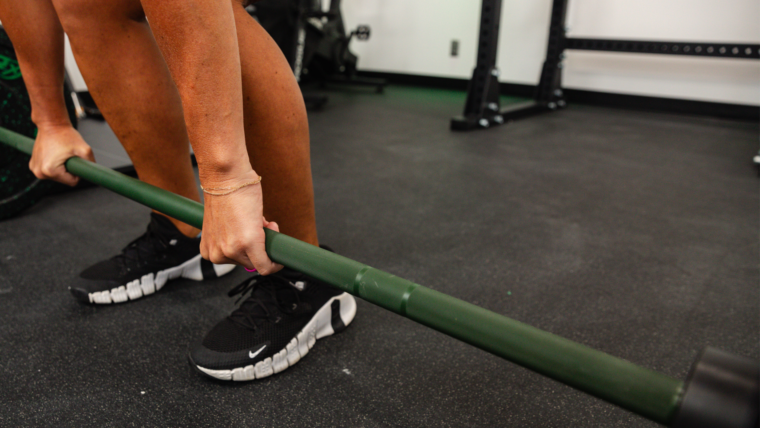
That said, if you’re training for a powerlifting competition or plan on maxing out on deadlifts often, you may want to choose a barbell with more aggressive knurling. The Colorado bar likely won’t slip out of your hands, but a barbell with sharper knurling may give you more peace of mind.
The barbell is only available in a 20-kilogram (44-pound) option with a 28.5-millimeter shaft diameter. This could be a drawback if you have small hands, as you may have trouble holding onto it for long sets before your grip and forearm muscles fatigue.
For more, check out our full REP Fitness Colorado Bar Review.
Best Olympic Barbell: Eleiko IWF Weightlifting Competition Bar
Pros
- Eight needle bearings for smooth and fast sleeve rotation
- Dust-proof seal helps keep the sleeves well-lubricated
- 28-millimeter shaft diameter meets IWF standards
Cons
- Not budget friendly
- Aggressive knurling may not suit beginners
- Not suitable for other strength sports
The Eleiko IWF Weightlifting Competition bar is considered the premiere Olympic weightlifting bar. It’s specifically made for professional and top amateur Olympic lifters. It will hold as much weight as you can load on it and has long 16.3-inch sleeves to accommodate as many plates as possible. The bearings provide a great spin, which is necessary for the snatch and clean and jerk, as it helps prevent excess stress on the joints. The whip (how much the bar flexes before bending permanently) can help you use momentum to lift the barbell as it changes direction quickly during the Olympic lifts.
However, this is an expensive barbell because it’s certified by the International Weightlifting Federation (IWF). If you’re not training in the Olympic lifts or if you are working on a budget for your home gym, this won’t be the barbell for you.
Best Specialty Barbell: Kabuki Strength Transformer Bar
Pros
- 24 different positions available
- Pop pin for easy changes
- Thick padding for comfort
Cons
- Can only be used for squats
- Finish will fade sooner
- Stickers on brackets instead of paint
Specialty bars are barbells that are made for specific purposes. Examples may include the trap bar, EZ-curl bar, and safety squat bar. The Transformer Bar is an advanced version of the safety squat bar that allows you to perform multiple squat variations with one barbell. You can simply pull the pin and move it up or down to any of the available holes on both sides, and it’s like you’re performing a whole different version of this basic leg exercise. A lower setting can be a substitute for a traditional safety squat bar while a higher setting may make it feel more like a hip hinge. There is even a setting that can simulate a front squat. It will also fit in any squat rack as a traditional barbell would.
With the Transformer Bar, you also hold the handles in the front, which can help with shoulder issues. The padding will provide the comfort you need to squat without neck or upper back pain. This is a squat-only barbell, so it may not be ideal if you’re looking for a more versatile training tool. And as it costs almost $800 (double the price of some other barbells on our list), lifters with limited budgets may not have a need for it. Kabuki Strength suggests beginners can use it, but you should have a base knowledge of how to squat with a traditional barbell before moving up to a bar like this. However, advanced trainees can enjoy this one for a long time to come.
Benefits of Training With a Barbell
A barbell can help you achieve any and all of your fitness goals. Barbell training can serve as a foundation of your overall fitness program. Lifters of all ages and experience can use barbells to get bigger, leaner, stronger, or faster. Barbells are more versatile than machines as well, plus they take up less space. Beyond that, they can serve athletes and beginners alike in multiple ways:
- Improved coordination
- Strength gains
- Overall health
- Improved stabilization and core strength
How To Take Care of a Barbell
A barbell is an investment, and you should pay attention to detail when it comes to taking care of it. That includes cleaning it regularly by wiping it down with basic soap and a cloth. You can also use a simple plastic or brass wire brush to get the chalk out of the grooves of the knurling. Doing this can also help prevent rust, which can negatively impact the life of your barbell.
What To Look For When Buying a Barbell
Buying a barbell shouldn’t be too difficult, but there are several components that should be considered. In order to purchase the best barbell for your personal training needs, think about the type of lifting you’ll be doing as well as the versatility of the bar itself. Also, are you the only person training or will multiple people be using it? Once you know those answers, consider the following factors as well.
Type of Barbell
The type of bar you want to use is important. Most barbells are made of steel, but some of them have different finishes that make them look better. Consider the climate you’re training in when looking for a training bar. If you plan on buying a barbell for outdoor training, or you will be using it in a humid garage or basement, then one with a color finish may not be the best choice because the elements can cause the coating to fade. You’ll want something with a steel or chrome finish. If you’re going to be using a barbell indoors exclusively that is climate controlled, then you can look at colors or specific finishes.
Bushings vs. Bearings
Bushings and bearings help the sleeve of the barbell spin as it’s moving so it can provide comfort for your wrists and elbows. Most barbells have bushings in them that are made of bronze, but some have bearings in them that maximize spin. If you’re going to be doing a lot of Olympic lifts and curls, then you may want to lean toward a bar that has high-quality bearings in them. If bushings are the way you need to go, bronze bushings that are self-lubricating will serve you well.
Weight Capacity
Most quality barbells are going to have a high weight capacity that you’re not likely to max out unless you’re training for world records. The weight capacity helps ensure that you won’t have to worry about the barbell bending permanently. Most bars have a capacity of over 1,000 pounds, while some have as much as 1,500 pounds.
Tensile Strength
Another way that companies promote the strength of their barbells is to share tensile strength, or the breaking point. If you see a tensile strength of 190,000 PSI, that means it would take over 190,000 pounds per square inch to break that barbell into two. Clearly, the higher the tensile strength, the better. Most high-end barbells will have a tensile strength of 190,000 PSI or more.
Spin
Olympic barbells are supposed to spin, which is why the bearings or bushings are so important. If you’re training in CrossFit or Olympic lifting, where the bar will be moving intensely and changing positions throughout the lift, then you want a barbell that will spin very smoothly. If you’re a powerlifter or training for general fitness, with movements that are straight up and down, then this may not be as high of a priority.
Whip
The whip refers to the slight bend, or flex, in the barbell when you’re pulling or lifting it up. Powerlifters may want a barbell with a decent whip to help them when performing the deadlift. A women’s barbell may not have as much whip as the men’s version because women might not use as much weight when it comes to the super heavy lifts, but if you train for strength, a barbell with a good whip can be a game changer.
Knurling
Knurling is the grip on the shaft of the barbell. It helps the trainee hold the weight comfortably or prevent the barbell from slipping. The less aggressive the knurling, the more comfortable it may be. Lifters that are training with heavy weights may want more aggressive knurling so it doesn’t slip out of their hands. Most barbells have medium knurling, which is about the middle ground.
Diameter
There are two diameters of a barbell to consider: the shaft diameter and the sleeve diameter. The shaft is where you hold the bar, and it should be a size that can fit in the hand without you having to sacrifice grip. Most barbells have a 28- to 32-millimeter diameter, and women’s barbells are generally 25 millimeters.
The sleeve is where the weight plates go. Standard barbells have one-inch diameters while Olympic bars have 1.9- to two-inch diameters. Standard barbells won’t support as much weight as Olympic versions, which is why there are no standard bars on this list. In any event, you should make sure the barbell will support your weights before placing the order.
Warranty
It’s never fun to buy something and have to return it. It does happen, and that is why the company’s warranty matters. Some companies have a period of time that you can get your money back, but they will replace the barbell if you deal with damage that you shouldn’t have to, such as a bushing or bolt inside the sleeve breaking. Companies have their warranties on their sites, and you should look them over before hitting that order button.
Final Thoughts
A barbell may be a simple training tool, but it’s not easy to pick the best one for your home gym. A versatile barbell that can help you train in multiple disciplines can be a great asset. If you are focusing on a single form of training such as powerlifting or Olympic lifting, a barbell built for your sport can help maximize your potential.
This guide could help you find a quality barbell that is within your budget, serves your training needs, and helps you achieve your goals. We feel these barbells are the best of the best on the market, and they would be great to have on your power rack. Choosing the right barbell and taking proper care of it can go a long way in enhancing your home gym experience.
Best Barbells: Side-by-Side Comparison
|
Description:
|
Description:
|
Description:
|
Description:
|
Description:
|
Description:
|
Description:
|
Description:
|
- Material: Steel or stainless steel
- Weight: 20 kilograms (44 pounds)
- Weight capacity: 680.2 kilograms (1,500 pounds)
- Tensile strength: 200 KSI
- Loadable sleeve length: 16.3 inches
- Knurling: Very aggressive
- Warranty: Lifetime
for Women
- Material: Steel
- Weight: 15 kilograms (33 pounds)
- Weight capacity: Not listed
- Tensile strength: 190,000 PSI
- Loadable sleeve length: 13 inches
- Knurling: Standard
- Warranty: Construction
on Amazon
- Material: Alloy steel
- Weight: 20 kilograms (44 pounds)
- Weight capacity: 544 kilograms (1,200 pounds)
- Tensile strength: 110,000 PSI
- Loadable sleeve length: 15 inches
- Knurling: Diamond (no center knurl)
- Warranty: 30 days
Barbell
- Material: Steel with chrome
- Weight: 20 kilograms
- Weight capacity: 907 kilograms (2,000 pounds)
- Tensile strength: 220,000 PSI
- Loadable sleeve length: 16.25 inches
- Knurling: Aggressive
- Warranty: One year
Barbell
- Comes with a lifetime guarantee against bending
- Weighs 20 kilograms (about 44 pounds) and has a 28.5-millimeter diameter
- 16.4-inch loadable sleeve length
- Dual knurl rings and no center knurl
- Material: Steel
- Weight: 20 kilograms (44 pounds)
- Weight capacity: 680.2 kilograms (1,500 pounds)
- Tensile strength: 190 KSI
- Loadable sleeve length: 16.1 inches
- Knurling: Moderate
- Warranty: Lifetime
Barbell
- Material: Swedish steel
- Weight: 20 kilograms (44 pounds)
- Weight capacity: Unknown
- Tensile strength: 215,000 PSI
- Loadable sleeve length: 16.3 inches
- Knurling: Aggressive
- Warranty: Lifetime
Barbell
- Material: Steel with foam padding
- Weight: 25 kilograms (55 pounds)
- Weight capacity: 544 kilograms (1,200 pounds)
- Tensile strength: Not listed
- Loadable sleeve length: 15.75 inches
- Knurling: None
- Warranty: Lifetime with conditions
FAQs
Different barbells have different prices because of various factors, such as where the metal was sourced, where it was made, if it has special bushings, or if you’re buying it for a specific type of training. Some barbells cost around $100, but they may not be of the best quality. You can expect to pay anywhere from $150 to over $500 for a solid barbell that will last for many workouts once you have it.
There are several versatile barbells that can hold up through all forms of training, but we feel the PRx Men’s Olympic Elite Bar is as good as it can get. It’s a reliable bar that can be used for powerlifting, CrossFit, bodybuilding, or any other fitness discipline you prefer to follow. It’s also reasonably priced. As long as you take care of it, it should last for several years.
If you’re training for a strength sport or competition, you will want to consider buying the best barbell possible for that sport. If your goal is to improve general fitness, you may not have to spend as much, and the money you save from buying a less expensive barbell could be used for dumbbells, kettlebells, or other fitness equipment that can help you reach your goals.
Beginners need a barbell that will last just as an advanced trainee would, but that doesn’t mean you have to break the bank to get one. Barbells like the Titan Fitness Elite Series Power Bar or The Beast by CAP Barbell are both reliable barbells that can be used for strength, endurance, or learning how to train with proper form. Either of those barbells will help a beginner and last until the lifter becomes advanced at training.
Barbells are great for helping with strength and muscle building, and working with free weights forces you to stabilize the weight as well. You can also use as much weight as you can handle with a barbell. They do keep your hands in a fixed position, though, whereas dumbbells allow you to move each arm freely while holding them. At the end of the day, using a barbell can help you achieve personal fitness success, and they are worth the investment.

